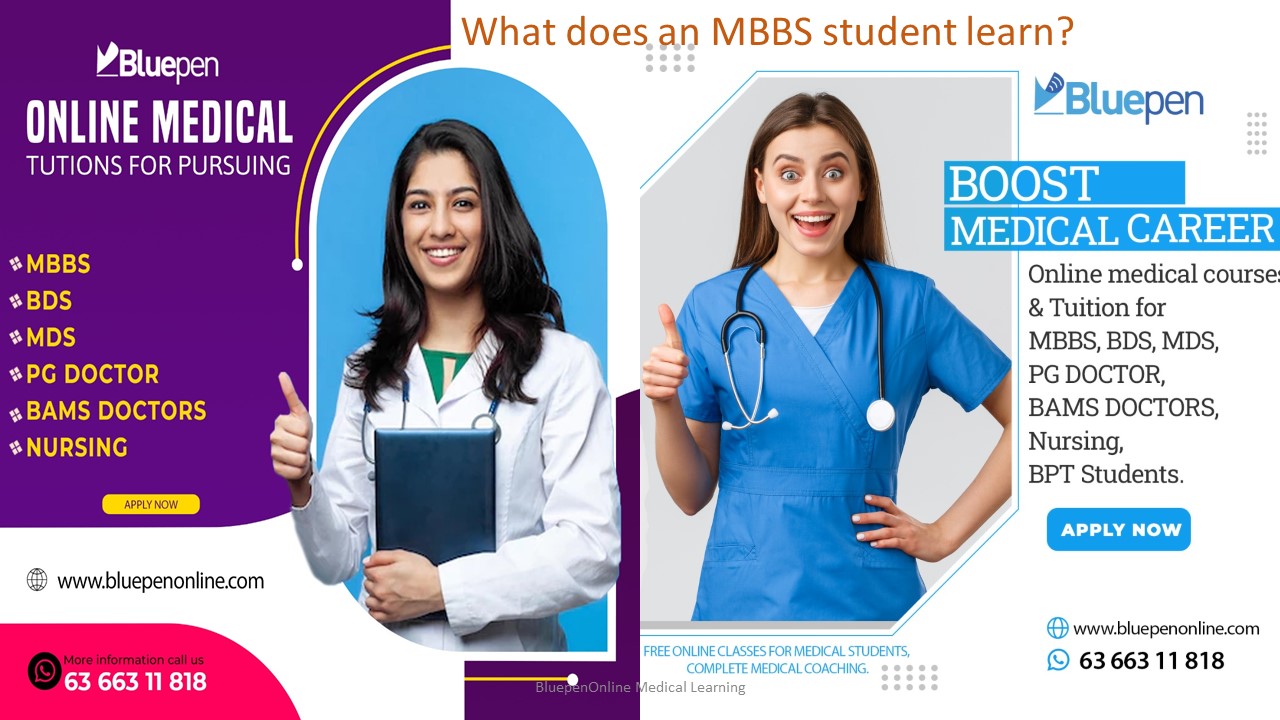
The MBBS (Bachelor of Medicine, Bachelor of Surgery) curriculum typically consists of three phases: Pre-Clinical, Para-Clinical, and Clinical.
Each phase covers different subjects and topics, building upon the knowledge and skills acquired in the previous phase.
Here's a detailed overview of these phases and the subjects covered:
Pre-Clinical Phase:
The Pre-Clinical phase focuses on building a strong foundation in basic medical sciences. The subjects covered in this phase include:
a. Anatomy: Anatomy is the study of the structure of the human body. It involves learning about the different organs, tissues, bones, and their relationships. Topics covered include gross anatomy (study of structures visible to the naked eye), histology (study of microscopic structures), and embryology (study of human development).
b. Physiology: Physiology deals with the normal functions of the various organ systems in the human body. Topics covered include the cardiovascular system, respiratory system, gastrointestinal system, renal system, endocrine system, and neurophysiology.
c. Biochemistry: Biochemistry focuses on the chemical processes and molecules that occur within living organisms. It covers topics such as cell biology, metabolism, enzymes, proteins, carbohydrates, lipids, and nucleic acids.
d. Pharmacology: Pharmacology is the study of drugs and their effects on the body. It involves learning about different classes of drugs, their mechanisms of action, therapeutic uses, side effects, and interactions.
e. Pathology: Pathology is the study of the nature and causes of diseases. It includes understanding the changes that occur at the cellular and tissue level in various diseases, as well as the principles of laboratory diagnosis.
Para-Clinical Phase:
The Para-Clinical phase focuses on the application of basic medical sciences to clinical practice. The subjects covered in this phase include:
a. Microbiology: Microbiology is the study of microorganisms such as bacteria, viruses, fungi, and parasites. It involves learning about the identification, classification, and characteristics of these microorganisms, as well as their roles in causing diseases and the principles of infection control.
b. Pathology: Pathology continues from the Pre-Clinical phase but with a more clinical focus. It covers topics such as the study of diseases, their causes, mechanisms, and manifestations, as well as the interpretation of laboratory tests and diagnostic techniques.
c. Forensic Medicine: Forensic Medicine deals with the application of medical knowledge to legal matters. It includes topics such as medical jurisprudence, autopsy, identification of unknown bodies, medical ethics, and principles of legal medicine.
d. Community Medicine: Community Medicine, also known as Preventive and Social Medicine, focuses on the health of communities and populations. It covers topics such as epidemiology (study of disease distribution and control), biostatistics, environmental health, occupational health, and public health administration.
Clinical Phase:
The Clinical phase involves practical training and rotations in different clinical specialties. It is usually divided into several rotations, including:
a. Medicine: This rotation involves the study and practice of internal medicine, including the diagnosis and management of various diseases and disorders.
b. Surgery: The surgery rotation covers different surgical specialties, including general surgery, orthopedics, neurosurgery, ophthalmology, ENT (ear, nose, and throat), and more. It includes both theoretical and practical aspects of surgical procedures.
c. Obstetrics and Gynecology: This rotation focuses on the care of women during pregnancy, childbirth, and postpartum period, as well as the diagnosis and management of gynecological conditions.
d. Pediatrics: The pediatrics rotation involves the care of infants, children, and adolescents, including their growth, development, and management of common childhood illnesses.
e. Psychiatry: This rotation covers the study and management of mental illnesses and psychiatric disorders, including psychological assessments and psychotherapy.
f. Other Specialties: The clinical phase also includes rotations in other specialties such as dermatology, radiology, anesthesiology, ophthalmology, and more.
Throughout the clinical phase, students are exposed to practical patient care, clinical examinations, and medical procedures under the supervision of experienced doctors.
It's important to note that the specific subjects and their sequence may vary slightly between different medical universities or countries, but the overall structure and content of the MBBS curriculum remain similar.
Bluepenonline.com is an online platform that offers various resources and support for MBBS students. Bluepenonline.com provides live classes, detailed discussions with Doctors and online support for MBBS students. These live classes offer flexibility in terms of subjects and timings, allowing students to learn from anywhere. Bluepenonline.com offers tuition and lecture notes specifically designed for MBBS students, as well as students pursuing BDS, MDS, PG DOCTOR, BAMS DOCTORS, Nursing, and BPT.